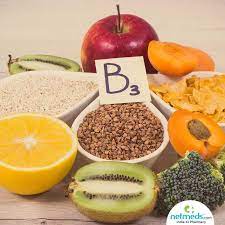Benefits, food sources of Vitamin B3
Vitamin B3, or niacin, is a water-soluble vitamin. It commonly occurs in two forms, namely nicotinic acid and nicotinamide. Vitamin B3 acts as a coenzyme, which is needed by more than 400 enzymes for various reactions in the body. It helps to convert nutrients from food into energy and plays a role in the metabolism of cholesterol and fats, the repair and synthesis of DNA, and the antioxidant reactions in the body.
Sources of vitamin B3. Vitamin B3 is found naturally in a wide variety of both animal and plant-based foods, including beef, liver, poultry, eggs, dairy products, fish, nuts, seeds, legumes, avocados, and whole grains. It is also found in fortified cereals and bread. Vitamin B3 can also be produced in the body from the amino acid tryptophan. When tryptophan is present in amounts beyond what the body needs for protein synthesis, it is converted in the liver to vitamin B3 in the form of nicotinamide.
The bioavailability of vitamin B3 is dependent on the food source. Vitamin B3 from meat, liver, beans and fortified products is highly bioavailable. Vitamin B3 naturally occurring in cereal grains may be poorly absorbed because the vitamin can be bound to the fibers in the grains decreasing its absorption. Even though it is a water-soluble vitamin, vitamin B3 is fairly heat resistant and can withstand reasonable cooking times.
Vitamin B3 deficiency and prevention. The deficiency of vitamin B3 is today largely uncommon because it is well-absorbed from most foods and is added to many fortified or enriched foods. People at risk of vitamin B3 deficiency include individuals living in poverty and people whose diets consist mainly of cereal grains like maize, rice, and barley. Individuals who drink significant amounts of alcohol are also at risk of vitamin B3 deficiency.
Severe vitamin B3 deficiency leads to a condition known as pellagra, which is characterized by dark scaly rashes on the skin, bright red tongue, and changes in the gut which leads to vomiting, constipation, or diarrhea. Neurological symptoms of vitamin B3 deficiency are depression, headaches, memory loss, fatigue, and hallucinations. Deficiency can be prevented by adequate consumption of foods rich in vitamin B3 or vitamin B3 supplementation.








